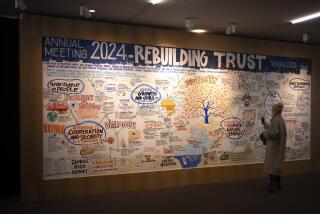What to Look for in Tokyo
- Share via
The Tokyo Summit offers an opportunity to sort out some thoughts on international trade before disagreements on the subject do more damage.
Each of the seven industrialized democracies going to the summit has its own agenda. But there have been encouraging signs of a growing consensus on the importance of a new round of world trade negotiations, this one to be enlarged to include for the first time the service and financial sectors, of particular importance to the United States.
The trade question will come to the summit in various forms in addition to plans for the next round of global talks. The enormous trade surpluses of two of the participants, Japan and West Germany, have created pressure on these nations to accept economic reforms that will reduce the deficits for their trading partners, including the staggering $130 billion deficit that the United States faces this year. These deficits are an important factor, but not the only factor, in the rising pressure for protectionism, so evident in the American Congress, but also visible in Japan, Western Europe and Canada.
A factor of great sensitivity for all seven of the summit nations is farm policy at a moment when the United States and the European Community are escalating trade warfare in agricultural commodities. Only through a cooperative agreement, in which all of the major farm export nations agree to free trade in food and fiber, and a reduction in the domestic farm subsidy programs, is there any likelihood of finding a solution.
President Reagan has moved across the Pacific toward Tokyo with a theme, “Winds of Freedom,” contrived by White House publicists for his travels. It is not yet clear just how he intends to translate that into an American position at the summit. He has seemed preoccupied with enlarging support for his own response to terrorism, a combination of military action and economic sanctions. There is much that the President can learn from the Europeans, who have been dealing with terrorism much longer than he, and much that he can teach them about the value of joint action to respond to the threat.
The summit has proven more useful for the communications it facilitates than for the problems it resolves. That is justification enough. It is a consultation of independent, sovereign states, each with much to learn from the others, which makes listening as important as speaking.
More to Read
Sign up for Essential California
The most important California stories and recommendations in your inbox every morning.
You may occasionally receive promotional content from the Los Angeles Times.













